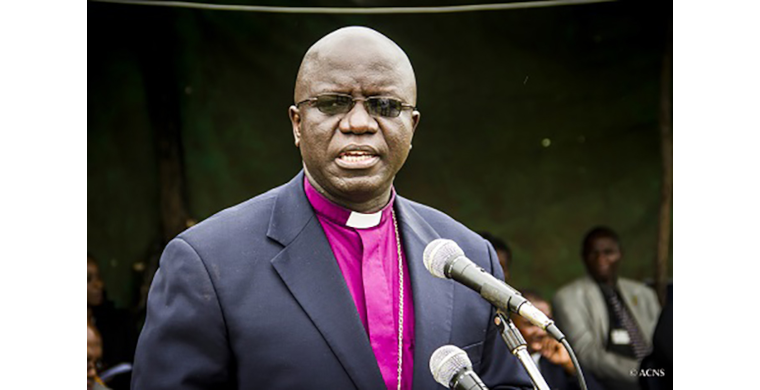Growing Church: Central Africa agrees women's ordination, more dioceses and new provinces
November 6, 2023
ACNS
2023 9:47 AM
Archbishop Albert Chama is Primate of the Church of the Province of Central Africa Photo Credit: Bellah Zulu / Anglican Communion News Service
The Church of the Province of Central Africa (CPCA) has concluded its provincial Synod with a plan for new dioceses and potentially two more provinces, or member churches, of the Anglican Communion. Under the theme "Growing the Church in the Broken World", more than 100 clergy and lay representatives from across the existing 15 dioceses -- Botswana, Lake Malawi, Northern Malawi, Upper Shire, Central Zambia, Eastern Zambia, Luapula, Lusaka, Northern Zambia, Central Zimbabwe, Harare, Manicaland, Masvingo, and Matabeleland -- gathered in Mount Soche, Blantyre in Southern Malawi, for the five-day meeting last week.
At the Synod's concluding Eucharist, the Primate of Central Africa, Archbishop Albert Chama of Lusaka, promulgated four motions that the Synod had approved after debate. The first was that those Dioceses in the Province that are ready to ordain women should be allowed to go ahead. The others were:
• the existing Diocese of Lake Malawi should be subdivided to make three new dioceses;
• the existing Diocese of Northern Malawi should be subdivided into two new dioceses; and
• the Creation of National Provinces for church growth.
The Provincial Secretary, Bishop William Mchombo, explained to the Anglican Communion News Service that the final motion would see new Provinces serving Malawi, Zambia and Zimbabwe. Botswana is currently only one diocese, and that that diocese will decide which country to join with in the new structure.
The proposal for new Provinces will be developed and submitted to the Anglican Communion Standing Committee who will consider it as part of a process for the adoption of new Anglican Communion Member Churches.
In addition to the Synod's members, representatives from some of CPCA's mission partners, including United Society Partners in the Gospel (USPG), the Council of Anglican Provinces in Africa (CAPA), the Anglican Alliance and the US-based Episcopal Church were in attendance.
At the conclusion of the Synod, the Bishops of the Province issued a Statement of Solidarity, in which they said: "a broken world is where the Church finds itself in but refuses to be consumed by the realities of brokenness, stress and trauma. The Church through the sacrament of reconciliation holds the oil of healing. We whom the spirit lights give light to the world.
"Brokenness means fragility through fragmentation. Fragmentation of families and communities is the opposite of the life-giving values of the kingdom of God."
The statement, signed by Archbishop Albert Chama (Lusaka) and Bishops Metlhayotlhe Beleme (Botswana), Francis Kaulanda (Lake Malawi), Fanuel Magangani (Northern Malawi), Alinafe Kalemba (Southern Malawi), Derek Kamukwamba (Central Zambia), William Mchombo (Eastern Zambia), Robert Mumbi (Luapula), Ignatios Makumbe (Central Zimbabwe), Farai Mutamiri (Harare), Erick Ruwona (Manicaland), Osiward Mapika (Masvingo) and Cleophas Lunga (Matabeleland), goes on to discuss a number of crises facing the world today, including the devastation caused by Cyclone Fred in Malawi, climate change and environmental waste affecting communities in the Democratic Republic of Congo, Ethiopia and Sudan, and the Russia -- Ukraine and Israel -- Palestinian wars.
"It is inconceivable that in the 21st century people of race, religion and ethnicity can still fail to recognise the humanity in the being of the other", the bishops said. "How then can people co-exist? The killing of one's enemy does not end war but rather the recognition of humanity in the face of the enemy does. There must be a recognition that we are all created in the image of God and therefore all have the right to exist.
"At the closing of Synod, the Church affirmed the words our Lord Jesus -- 'I have come so that they may have life and have it in abundance.'"
"Members of the Church of the Province of Central Africa pray and stand alongside all those suffering violence, poverty, rejection and are in areas of conflict. Christ is invited to give life not just life but the life he promised, life in abundance free from violence, hunger and hatred. The life of peace."
The closing Eucharist was followed by the planting of trees in the precincts of the Diocese of Southern Malawi's Saint Paul's Cathedral. The planting of trees to mark significant events is promoted by the Anglican Communion Environmental Network and has become a common feature in the Anglican churches of southern Africa.
FOOTNOTE: GAFCON Archbishop Foley Beach told VOL that no GAFCON province has allowed the ordination of women...yet.














